The Intel Xeon W Review: W-2195, W-2155, W-2123, W-2104 and W-2102 Tested
by Ian Cutress & Joe Shields on July 30, 2018 1:00 PM EST- Posted in
- CPUs
- Intel
- Xeon
- Workstation
- ECC
- Skylake-SP
- Skylake-X
- Xeon-W
- Xeon Scalable
Benchmarking Performance: CPU Legacy Tests
Our legacy tests represent benchmarks that were once at the height of their time. Some of these are industry standard synthetics, and we have data going back over 10 years. All of the data here has been rerun on Windows 10, and we plan to go back several generations of components to see how performance has evolved.
All of our benchmark results can also be found in our benchmark engine, Bench.
3D Particle Movement v1
3DPM is a self-penned benchmark, taking basic 3D movement algorithms used in Brownian Motion simulations and testing them for speed. High floating point performance, MHz and IPC wins in the single thread version, whereas the multithread version has to handle the threads and loves more cores. This is the original version, written in the style of a typical non-computer science student coding up an algorithm for their theoretical problem, and comes without any non-obvious optimizations not already performed by the compiler, such as false sharing.
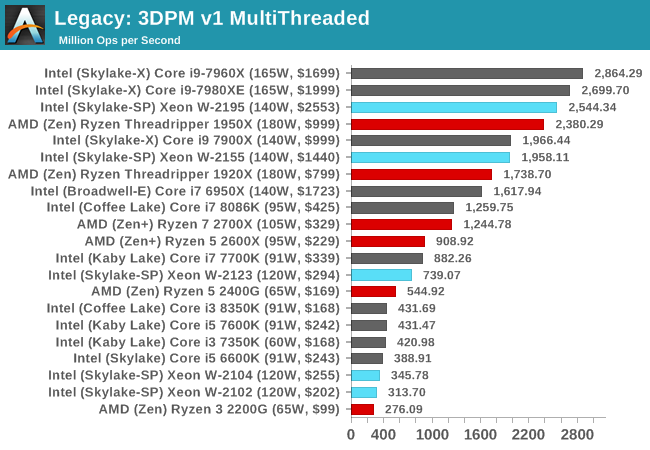
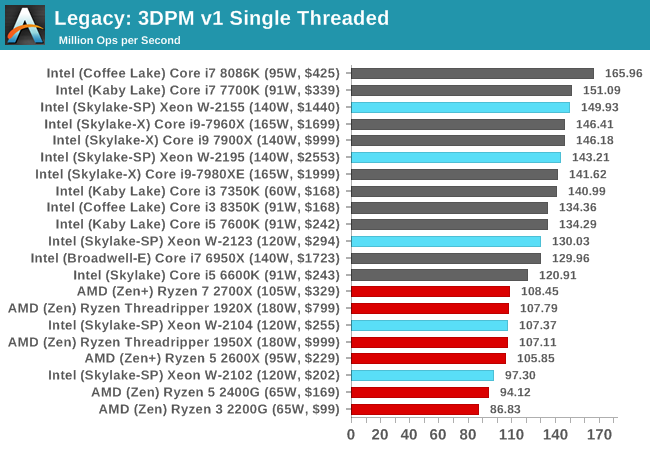
CineBench 11.5 and 10
Cinebench is a widely known benchmarking tool for measuring performance relative to MAXON's animation software Cinema 4D. Cinebench has been optimized over a decade and focuses on purely CPU horsepower, meaning if there is a discrepancy in pure throughput characteristics, Cinebench is likely to show that discrepancy. Arguably other software doesn't make use of all the tools available, so the real world relevance might purely be academic, but given our large database of data for Cinebench it seems difficult to ignore a small five minute test. We run the modern version 15 in this test, as well as the older 11.5 and 10 due to our back data.
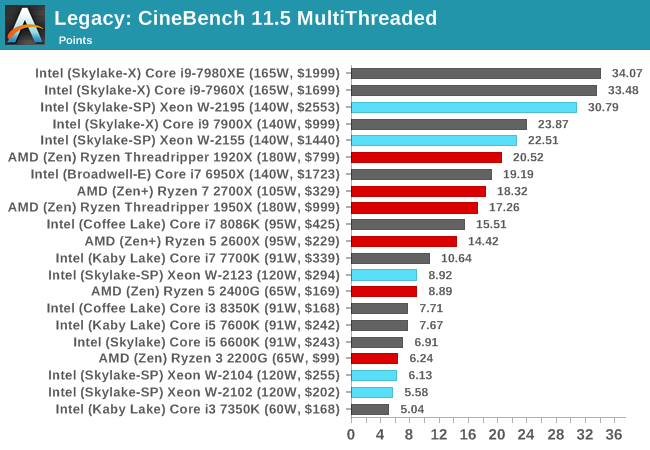
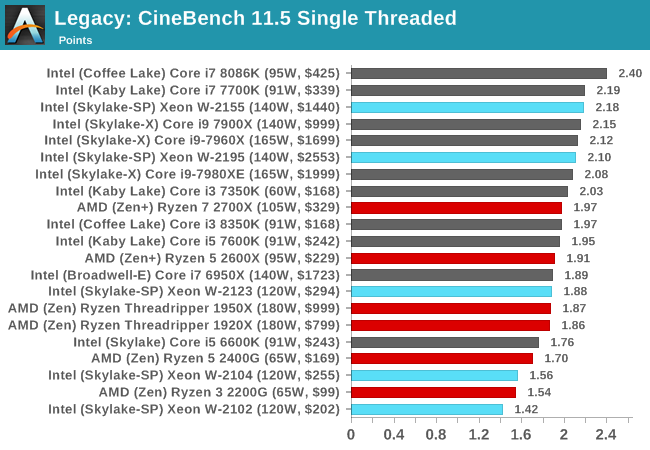
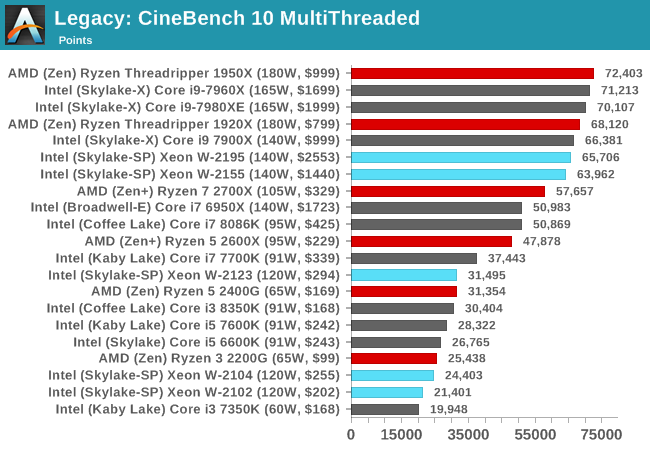
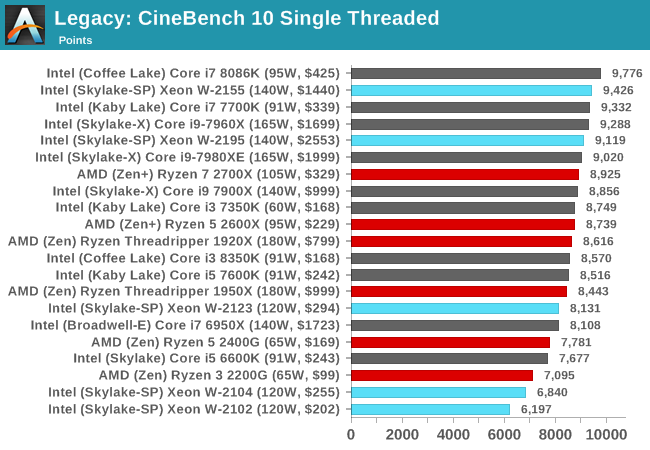
x264 HD 3.0
Similarly, the x264 HD 3.0 package we use here is also kept for historic regressional data. The latest version is 5.0.1, and encodes a 1080p video clip into a high quality x264 file. Version 3.0 only performs the same test on a 720p file, and in most circumstances the software performance hits its limit on high end processors, but still works well for mainstream and low-end. Also, this version only takes a few minutes, whereas the latest can take over 90 minutes to run.
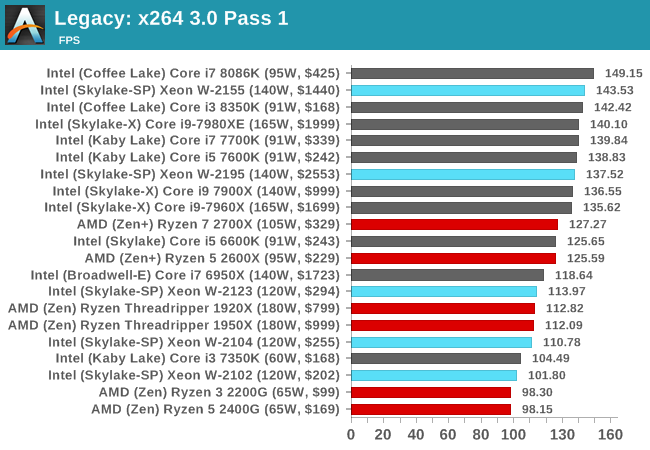
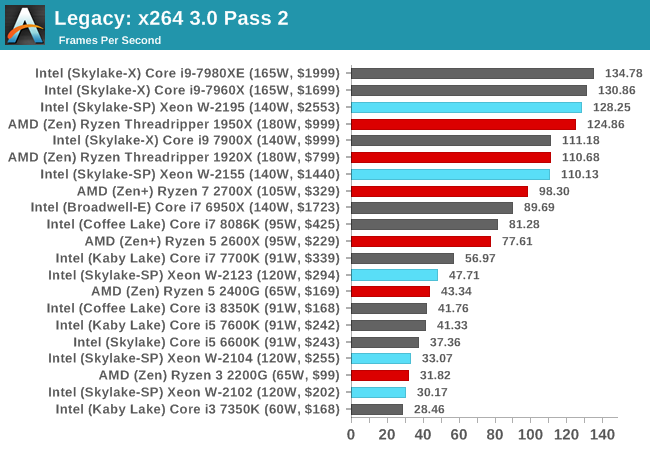










74 Comments
View All Comments
0ldman79 - Tuesday, July 31, 2018 - link
Agreed.I imagine there will be several situations where the 6 core 12 thread i7 will outperform the i9 9700.
If the cache increase is enough that may not happen, but I'm not betting on it making up enough of a difference.
Icehawk - Friday, August 3, 2018 - link
The 8086 is functionally equivalent to the 8700, they trade blows in a pretty tight grouping so I don’t mind that they used it’s scores.mode_13h - Monday, July 30, 2018 - link
Their pricing is nuts! These can only make sense if you're desperate for PCIe lanes or lots of cores (and, for some reason, don't want AMD).I have an older E5 Xeon and wanted to replace it with a W-series, but I can't justify this pricing (or the performance hit taken on the lower-core-count models, relative to desktop/E-series chips). I will have to opt for either an E-series Xeon or a Ryzen. At this rate, I see myself going for a 7 nm Ryzen, actually.
I think AMD is smart for using narrow AVX units. > 256-bit doesn't really make sense for much that wouldn't be better-served by a GPU. AVX-512 was a strategic misstep for Intel, and they're just going to have to live with it.
mode_13h - Monday, July 30, 2018 - link
Oh, and let's not forget the IHS TIM issue.I'm not in the market for > 8 cores, but those who are will be disappointed by the rate of thermal throttling, due to this being their first (recent) workstation/HEDT chip with a non-soldered IHS.
0ldman79 - Tuesday, July 31, 2018 - link
I missed that.The IHS is using TIM even on the Xeon now?
That was honestly the one big reason I was looking at the Xeon. That's just a poor business decision. Xeon carries a price premium, they could at least guarantee the heat conductivity is going to be enough to keep it running cool and smoothly for the life of the chip.
mode_13h - Wednesday, August 1, 2018 - link
I don't know this for a fact, but their Xeons are normally just binned HEDT processors without the special features fused off. So, I assume it's the same crappy TIM under that IHS.Comparing thermal performance @ the same clock for 10+ core models vs the i9's would easily show whether this is true.
HStewart - Monday, July 30, 2018 - link
"I think AMD is smart for using narrow AVX units. > 256-bit doesn't really make sense for much that wouldn't be better-served by a GPU. AVX-512 was a strategic misstep for Intel, and they're just going to have to live with it."AMD's AVX 2 is only 1/2 of Intel AVX 2 - that sound like they are using dual 128 bits instead 256 bits
Also keep in mind Intel CPU also have AVX 2 support your statement makes no sense.
HStewart - Monday, July 30, 2018 - link
https://forums.anandtech.com/threads/ryzens-halved...bill.rookard - Monday, July 30, 2018 - link
The thing is - and this is somewhat critical for a workstation based board, you're NOT really going to be using it for single threaded tasks. You'll be using software which has for the most part SHOULD be multi-threaded. Considering that the Threadripper is a 16c/32t CPU in the gen1, and running for a street price of about $800ish, and the gen2 is going to be a 32c/64t beastie of a CPU at a price of $1500ish, why would you spend $2500 on a 18c/36t Intel CPU?You could just as easily do some research to find people who have indeed put together some TR/ECC combos, and put a complete AMD system for the price of an Intel CPU alone.
mode_13h - Tuesday, July 31, 2018 - link
That's nuts, dude. For software development, I want lotsa cores for parallel builds. When recompiling only a few files, I want fast single-thread perf.The reality is that there are still lots of places in day-to-day computing where single-thread perf matters. I don't know how you can possibly believe you accurately represent the needs of all workstation users, but you don't.